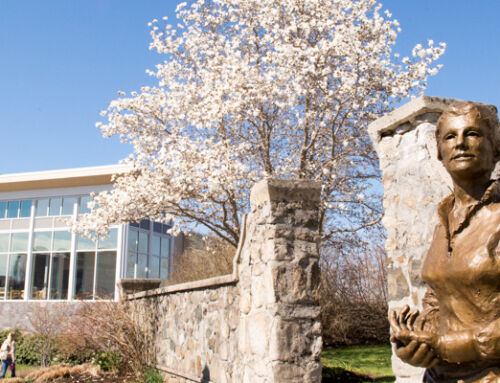FOR IMMEDIATE RELEASE
From the SJC Press Room
STANDISH, MAINE – As part of the effort to contribute solutions to the challenges facing New England’s food system, Saint Joseph’s College will host the 2018 New England Food System Innovation Challenge beginning on Friday, November 9, 2018 and concluding on Sunday, November 11, 2018.
This is the second consecutive year that the College has invited student and professional entrepreneurs to participate in thoughtful discussions and strategic planning focused on developing the region’s food and beverage industry while meeting food security goals in sustainable ways.
College teams will be presented with this question: How might we create products, services, apps, or organizations that support the expansion of production, distribution, processing, and consumption of local, sustainably produced food and seafood?
Teams from Saint Joseph’s College, Unity College, College of the Atlantic, and the University of Southern Maine will make their pitches to three judges on Sunday morning at 11 AM with winners announced at 2:15 PM. The public is invited to watch.
Students will consider products or services that address one or more of the following: helping food producers become resilient in light of climate change; applying big data to small-scale production; utilizing the Internet of Things (IoT) to bring efficiency to small producers and harvesters; providing equal access and ability to purchase healthy food to all, reducing or repurposing food waste; making the food supply chain transparent to all; reducing or conserving inputs – like water – in the production of healthy, sustainably produced food; using drones to improve the efficiency of small, diversified farms; and integrating aquaponics, hydroponics, or land-based aquaculture into the food system.
Saint Joseph’s College students Tylor Dubois ’20 and Nick Guiou ’21 will pitch their idea for a design of a minimum viable product (MVP) for the Hannaford Food Venture Center, which will be a small-scale food manufacturing incubator built adjacent to the Stone Barn at Sebago Lake, located directly across from Saint Joseph’s College’s campus entrance. It is part of the College’s ambitious Institute For Local Food Systems Innovation (ILFSI), which is designed to support New England’s capacity to produce at least 50% of food consumed, help double the region’s food manufacturing employment over ten years, and provide critically needed workforce training through courses and certificates in hydroponics, food manufacturing, food branding and merchandising, and agritourism.
Tylor and Nick are members of MABLab!, a new student entrepreneurism and innovation hub at Saint Joseph’s that connects students with Maine’s emerging economy by developing student entrepreneurial skills and their business networks. Throughout the fall semester, the pair has met with manufacturers, producers, and entrepreneurs with visits to the Fork Food Lab in Portland and Commonwealth Kitchen, a food incubator located outside of Boston.
In addition to the College Teams, nine Enterprise Teams will face off in the New England Food System Innovation Challenge by addressing this question: How might we create new models of aggregation, distribution and new products through innovative processing that adapt to local and regional needs, utilize technology (high-tech and low-tech) and are sustainable – both financially and ecologically – while offering a fair return to the farmer or fisherman at a fair price to the buyer, and minimizing their carbon footprint?
Judges are looking for bold ideas pushed by people who want to challenge each other and the status quo. They expect solutions that move beyond farmers’ markets, CSAs, and farm-stands and that create new models that adapt to local and regional needs, utilize technology, and test creative business structures such as cooperatives, enterprising non-profits, and L3Cs.

Hayley Winslow (left, Business Planning Analyst and MABLab! Program Coordinator), Tylor Dubois ‘20 (center), and Nick Guiou ‘21 (right) review the College’s site for the Hannaford Food Venture Center while discussing potential assets in the area.
About Saint Joseph’s College of Maine
Founded in 1912 by the Sisters of Mercy in Portland, Maine, Saint Joseph’s College is Maine’s Catholic liberal arts College with a commitment to sustainability and wellness. The 474-acre campus, located on the shore of Sebago Lake in Standish, Maine offers more than 40 undergraduate programs and a nationally renown Division III athletic program to a population of approximately 1,000 on-campus students. The College provides certificates and undergraduate and advanced degrees for thousands more working adults who reside throughout the United States and in more than 20 other countries through an online learning program. In 2015 the Carnegie Foundation for the Advancement of Teaching recognized the College’s focus on community service through its mission and daily interactions with local, regional, and global communities with the Community Engagement Classification.
About New England Food System Innovation Challenge
The Challenge is in its fourth year and is a program of the Sustainability Lab of Yarmouth, Maine. Since 2015 over 30 Enterprise and College Teams have participated in the Challenge and 14 winners have received $35,000 in cash prizes and $15,000 in professional services. The Sustainability Lab also operates Fork Food Lab, which it took over on October 1, 2018.
For more information about the New England Food System Innovation Challenge, contact Bill Seretta at bill.seretta@theslab.org or visit: http://maineinnovationchallenge.org/wpa/
For more information about the Institute for Local Food Systems Innovation at Saint Joseph’s College, visit: https://www.sjcme.edu/local-food-systems/
For more information about the Center for Sustainable Communities at Saint Joseph’s College, visit: https://www.sjcme.edu/centers/sustainable-communities/
View a video from the 2017 Maine Food System Innovation Challenge: https://vimeo.com/252044306



